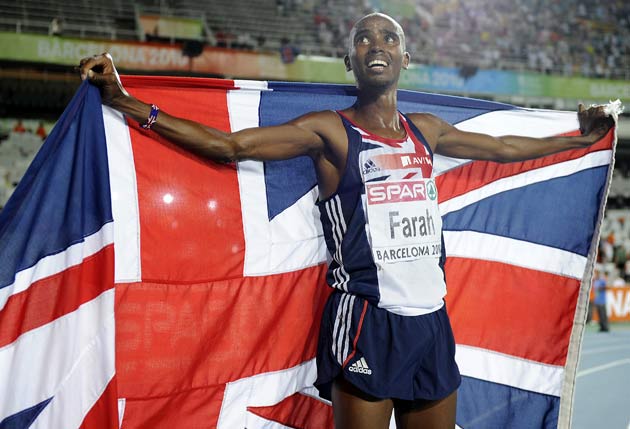Athletics: The moments of 2010
With 2010 drawing to a close, we asked our sport correspondents to cast their minds back over the last 12 months in their specialist fields to recount their moment of the year.

Your support helps us to tell the story
From reproductive rights to climate change to Big Tech, The Independent is on the ground when the story is developing. Whether it's investigating the financials of Elon Musk's pro-Trump PAC or producing our latest documentary, 'The A Word', which shines a light on the American women fighting for reproductive rights, we know how important it is to parse out the facts from the messaging.
At such a critical moment in US history, we need reporters on the ground. Your donation allows us to keep sending journalists to speak to both sides of the story.
The Independent is trusted by Americans across the entire political spectrum. And unlike many other quality news outlets, we choose not to lock Americans out of our reporting and analysis with paywalls. We believe quality journalism should be available to everyone, paid for by those who can afford it.
Your support makes all the difference.It was the night before the Catalan Parliament met to decide to outlaw bull-fighting, and in the Olympic arena high up on Montjuic, the hill overlooking the centre of Barcelona, Mo Farah was performing the role of matador supreme. It was the first track final on the opening night of the European Championships, and the stick insect of a runner in the Great Britain vest was toying with the Spanish opposition in the 10,000m. It was a joyous sight to behold for those of us who have followed the plummeting fortunes of British men's distance running since the highs of the 1970s and 1980s.
Even in the glory days of Dave Bedford, Brendan Foster, Mike McLeod and Steve Jones, no male British athlete managed to capture the European 10,000m crown. Farah, the Somali-born, London-raised leading light of latter day British men's distance running, was in the process of ending the historical anomaly - and in the kind of style that might have been drawn directly from the Bedford book of showmanship.
With three laps of the 25 remaining, Farah was leading the way when he suddenly stepped into lane two and ushered Ayad Lamdassem, the Spanish champion, in front. As he did so, he put the index finger of his right hand to his lips in a shushing gesture to the partisan Spanish crowd.
It was heat-of-the-moment hubris. You could hardly wish to encounter a more self-effacing soul than Farah but on this sultry Catalan night he knew he was going to beat the Spaniards to the gold and he was determined to wring every last drop of enjoyment out of it. At the previous European Championships, in Gothenburg in 2006, he had been beaten to the 5,000m gold medal by a tantalising 0.09sec. His tormentor on that occasion had been a Spaniard by name as well as nationality: Jesus Espana.
Four years on, at the 2010 European Championships in Barcelona, Farah had Espana and the 5,000m to come later in the week. In the 10,000m final he had a job to finish, and a Spanish rival to finish off.
With two laps to go and Lamdassem straining every sinew to get away from him, Farah turned behind and stretched out an arm, gesturing to Chris Thompson, his British team-mate, to come and join him. The pair went back a long way, to youthful days as rivals at the English schools' championships. In 2003 Thompson won the 5,000m ahead of Farah at the European Under 23 Championships at Bydgoszcz in Poland. Since then, he had been held back by a succession of injuries.
With 3000m to go, Farah finally put poor Lamdassem out of his misery, kicking decisively clear and savouring the golden moment in the home straight. His sense of joy doubled when he crossed the line and turned to see Thompson finishing like a train to snatch second place. He seemed as chuffed for Thompson and his silver and he was for himself and his own gold.
“It just so great to see this man back,” Farah said, slapping Thompson on the back at track-side. “Me and Chris go way back. I remember when we came down the home straight at the European cross country trials in Margate holding hands together. He's been through a lot to get here.
“To come first and second in European is amazing. It just feels so great. It means a lot to me after what happened in Gothenburg four years ago.”
What happened to the Great Britain track and field team as a whole in Gothenburg in 2006 was an all-time nadir. For the first time in the history of the European Championships, stretching back to 1934, they failed to produce a winner in an individual event. There was one gold, from the men's 4 x 100m relay, but that was tarnished by the post-race row over the selection of Dwain Chambers and Darren Campbell's refusal to celebrate with the re-instated doping offender.
Farah's gold was the first of six for British athletes in Barcelona, and the first of a record haul of 19 medals in all. He claimed a second gold himself five days later, beating Espana in the 5,000m final to fully lay the ghost of Gothenburg.
Join our commenting forum
Join thought-provoking conversations, follow other Independent readers and see their replies
Comments